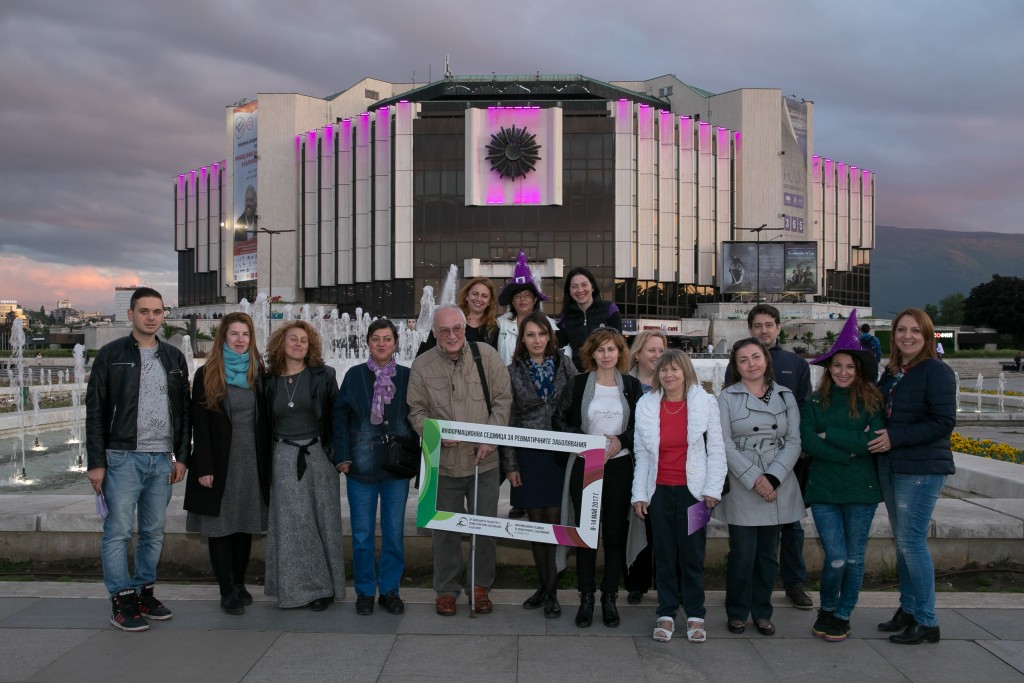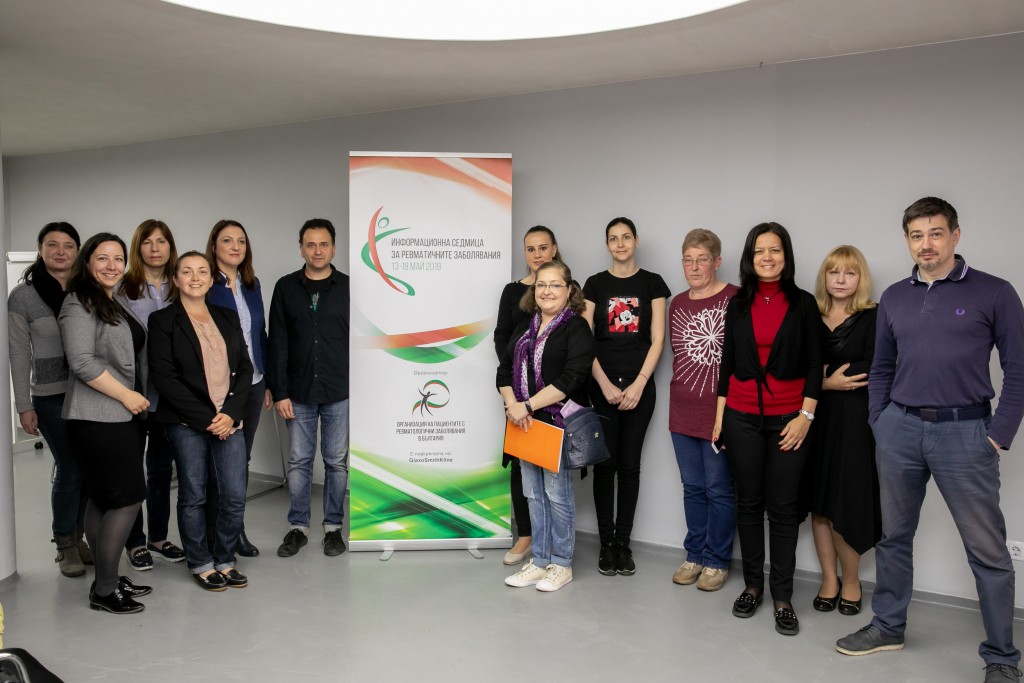Welcome back to our blog series on National Member News! We remain very excited about getting our National Member news out to the world, so more people can find out a lot more about what it is happening in each country and each organisation!
We caught up with Boryana Boteva from Lupus Bulgaria, who talked to us about the amazing work that Lupus Bulgaria are doing, the needs of lupus patients in Bulgaria, access to medications, COVID19 and so much more!

Photo of World Lupus Day Celebrations – 2017
How do you keep in touch with or have contact with your members?
That is a very good question! We have a very large facebook group, with about 6000 members. Members of our facebook group have all kinds of rheumatic and musculoskeletal diseases (RMDs); we have a number of members with lupus.
We talk to our members through our facebook group. We use the group to inform members about new administrative procedures or medication shortages.
Medication shortages can occur in Bulgaria, they are not an issue only because of the pandemic. During the pandemic we had a problem with hydroxychloroquine (HCQ). HCQ was not a registered medication for lupus, and this created serious access problems for people; thankfully it now is a registered medication. We have a Bulgarian brand of HCQ too, but unfortunately this is very expensive and the cost of HCQ cannot be reimbursed by the National Health Insurance Fund. People can buy HCQ through pharmacies, but they have to be able to cover the cost of the medication.
The only medication that is reimbursed completely by the National Health Insurance Fund in Bulgaria for lupus patients is Benlysta. People with other RMDs have coverage for other medications too through the National Health Insurance Fund, such as some biologics and corticosteroids. This is not the case for lupus patients.
The process to get a particular medication approved for coverage through the National Health Insurance Fund is complicated. For lupus patients, medications like Rituximab or Intravenous Immunoglobulins are not covered by the National Health Insurance Fund at all; they can only be used off label and patients have to cover the entire cost of the medications privately.
Our group has taken several actions to try to improve this situation for patients. We have campaigned, we have had conversations with the Minister of Health about the situation, but so far there has been no progress. One of the difficulties is that there is only an interim government in Bulgaria at the moment. National elections are due to take place in July; we hope to have a government after this time, and we hope the new government will try to make positive changes for people.
Did you have any special meetings or webinars during the past year (World Lupus Day, Rare Disease Day, Annual General Meeting etc)?
We have had a number of webinars for other RMDs this year, but we have not had webinars for lupus. Our facebook group is very active and we do regularly discuss problems lupus patients face in the facebook group.
We also created a survey this year. This was completed by patients with RMDs, including lupus. We wanted to find out how people feel, what they want to learn, what is their quality of life, what kind of access to treatment they have et cetera. We had 500 responses from people with rheumatic diseases; 170 of those 500 responses were from people with lupus.
We then presented the results of our survey to the media. We also wrote a letter to our Institutions, such as the National health insurance fund, the Ministry of Health etc, to inform them of the difficulties people face with access to treatment and of the fact that early diagnosis is still a problem for people.
We are hopeful things will improve with the new Health Minister. He is more open to talk with patient organisations, in fact he used to lead an organisation that deals with patients and doctors and problems in the healthcare system. He is a very different Health Minister because he has practical experience with how things actually are.
Has it been difficult to keep connected with your members during the Covid19 pandemic?
No, it was easy to keep connected with our members because of social media.
Have there been any circumstances during the pandemic that changed the way of living with lupus?
Contact with rheumatologists was very difficult before the pandemic, it became almost impossible during the pandemic. Unfortunately, like in most other countries, there was a lockdown. This meant that hospitals were closed, and this had an impact on the way people dealt with their chronic condition.
It wasn’t possible for people to have appointments with specialists during lockdown. People tried to talk with their doctors on the phone to have some healthcare during lockdown. Our group became even more important; we tried to solve the problems people were facing together in the group during lockdown.
GPs were open during lockdown, but people could only talk with them on the phone; they couldn’t visit. Regular reviews and care were generally mostly over the phone for patients. Of course, if there was something urgent or life threatening, people could visit hospitals and be admitted.
The situation has thankfully gone back to normal now in terms of hospital appointments and reviews, because our covid19 numbers are lower.
Has Digital Health improved or changed in your country?
This is a very difficult issue. Digital Health in Bulgaria is very new, our Institutions are only just taking their first steps with digital health. For example, electronic prescriptions have just started to become established, but the reality of how they work is not how we imagined it would be.
So today I visited my GP to get my electronic prescription. This is very strange because even though the prescription is supposed to be electronic, I still have to physically go to the GP. I then had to wait and to take a code which I could then present to the pharmacist and then with that code I could pick up my medications. So, in terms of electronic prescriptions, patients have to physically go to the GP to sign a number of papers, the GP then receives a code that corresponds to the prescription, the GP records the medications being prescribed using that code, then writes the code in the patient’s medication prescription booklet and the patient then has to go to the pharmacy with the code to get the medication. This is not at all how we imagined electronic prescriptions would work.
There are some platforms for online consultations, but they’re not reimbursed by the National Health Insurance Fund. They are private platforms, where patients must cover the cost of the consultations, they are private consultations. Some legal changes would have to be made to the system to allow patients to be reimbursed for online consultations. The government will work on this problem. In the future we hope things will be better in terms of online consultations for people.
Another difficulty in Bulgaria is that the medications that are covered by the National health insurance fund can only be prescribed by the GP. If a patient needs a medication that is not covered by the National Health Insurance Fund, then that can be prescribed by a specialist. For example, if a patient needs hydroxychloroquine (i.e. a medication that is not reimbursed), the rheumatologist can write that prescription. But if a patient needs Benlysta (i.e. a medication that is reimbursed), this should be prescribed by the GP. However, before the GP can prescribe the medication the patient would have to go before a Committee to get authorisation to use that medication. We have protocols last only for six months, so people have to go before the Committee every six months to get permission to continue their treatment. This is a very long process. The prices of medications are also higher compared to other European countries. This is not the case just with lupus medications, but for all RMDs.
During lockdown these protocols were prolonged by the government. Patients didn’t have to visit the Committee during lockdown, an exception was made. So, things were a little easier for lupus patients on Benlysta. But if a lupus patient needed to go on Benlysta for the first time then they either had to wait for lockdown to end or they had to take a risk (with covid19) and visit the Committee in person to submit their application. Most people waited for lockdown to end.
The process to access Benlysta for a lupus patient is as follows. The doctor says a patient needs Benlysta and prepares a document to confirm this. The patient has tests, goes before the Committee for approval. Assuming the Committee approves the application, the patient has to retrieve the paperwork, go to the National Health Insurance Fund and deposit the paperwork there. The patient then has to wait two months to see if the National Health Insurance Fund approves the treatment or not.
It’s possible that the Committee may determine that a patient needs the treatment and approves it, but that then the National Health Insurance Fund rejects that person’s application. Even if the treatment is approved, the protocol only lasts for six months so patients have to repeat the entire process every six months. Thankfully when they submit an application to prolong (versus start) treatment the approval by the National Health Insurance Fund normally takes one month and not two. People have to time the approval process correctly so there are no gaps to their treatment. Some people do not go through this process because it’s very complicated and very long – too difficult for patients. In Bulgaria around 150 lupus patients use Benlysta.
GSK, the company that produces Benlysta, has now left Bulgaria. We are worried this will make the process to access Benlysta even more difficult for people in Bulgaria. GSK no longer has an office in Bulgaria. This is very sad. Our organisation has completed projects, funded by GSK, about lupus. In previous years we did a lot of things for lupus, we had a lot of meetings, we held roundtables on lupus; these projects were funded by GSK. It’s not clear we can keep such projects going without this funding.

Lupus Awareness Week 2019 – Discussion about Problems Lupus Patients Face
What would you most need as support in your country for lupus?
We need information about the use of intravenous immunoglobulins (IVIG) in lupus patients. IVIG is used a lot in Bulgaria for lupus patients, we – as an organisation – want to explore whether there might be a possibility to have some trial data for this, so we might start the process to maybe get this registered and approved as a treatment for lupus patients here.
We also need information about new treatments and information about the situation in other countries compared to ours.
In terms of support for access to medications or to change legislation, it’s not sure anyone outside of Bulgaria can help us, we have to make changes by ourselves. The situation is incredibly individual to each country in terms of access to medications and legislation.
Is there anything you think Lupus Europe could help your organisation with?
We find the webinars and Conventions Lupus Europe organises very interesting. We share them in our facebook group, and we often translated them too. For example, the session by Petro Machado on Covid19 and people with RMDs, from the LUPUS EUROPE Convention in the Clouds – 2020, we shared it in our group, and we translated it into Bulgaria. This is a way you can help us: by continuing to organise such webinars, Conventions and meetings.
Is there any topic/theme/area that you think Lupus Europe should focus on, on something where European collaboration would make sense?
This is a difficult question. Our main problems relate to medication. We are not sure Lupus Europe can help us in this, but if you find a way when connecting with the European Medicines Agency (EMA) or in any other way we will be very happy to hear your suggestions.
There is also a big problem here with treatment approvals. Treatments are approved very late and the process for treatments to be approved is very hard. This significant delay in treatment approval is not unique to lupus, it happens in other conditions too; treatments are approved much later than in other countries. We hope that the EMA are aware of the delays with regards to treatment approvals and access to medications patients face in Bulgaria.
You sometimes collaborate with other countries – for example you bought some HCQ from Greece. Which countries do you collaborate with, for support or for medications?
People from Bulgaria travel to other countries like Greece, Germany, Turkey to buy HCQ. We don’t collaborate with organisations about this, people simply travel to those countries, buy HCQ and other medications for many people. This is a difficult process in some countries, because to get – for example HCQ in Greece– you need to have a local prescription from a local doctor.
We do have connections with other organisations through AGORA (i.e. a Platofrm of organisations of people with rheumatic diseases in Southern Europe) and through EULAR of course. The problems patients face in countries that are members of AGORA are similar, so it’s very useful to be a part of this platform.
We are trying very hard, and you know we are volunteers and things are becoming harder and harder.
Are you aware of the Lupus Europe Member Capacity Building Program?
Yes, we know about the capacity building program. We would like to know more about it.
Could you tell us a bit about a dream you have as a group?
We dream about access to medications that are accessible in other countries. We also dream about those medications being covered by the National Health Insurance Fund.
We dream about people being able to access psychological support, which is not at all covered in Bulgaria. We were going to organise support groups for people with RMDs, including lupus, so people could access psychological support. The pandemic changed our plans, but now maybe we will try again to organise support groups.
We also dream of better connections with our doctors, better communication.
It will be interesting to read about what other LUPUS EUROPE National Member organisations dream about; are they having the same problems that we are having?
There are a lot of things we dream for, but these are the most important and the most basic let’s say. [/vc_column_text][/vc_column][/vc_row]



